Social Psychology Report: Conformity, Obedience, and Social Behavior
VerifiedAdded on 2021/01/01
|6
|1482
|235
Report
AI Summary
This report delves into the realm of social psychology, examining how individuals behave within social contexts. It explores key concepts like conformity and obedience, providing theoretical explanations for these behaviors. The report discusses the Normative Social Influence Theory and Social Impact Theory, along with the Agency Theory and Milgram's experiment, highlighting their strengths and limitations. It further analyzes how social power influences behavior and suggests ways to change or control it. The conclusion emphasizes the importance of understanding social psychology for promoting pro-social behavior and making informed decisions. The report also includes a comprehensive list of references, including books, journals, and online resources, providing a solid foundation for understanding the subject matter.
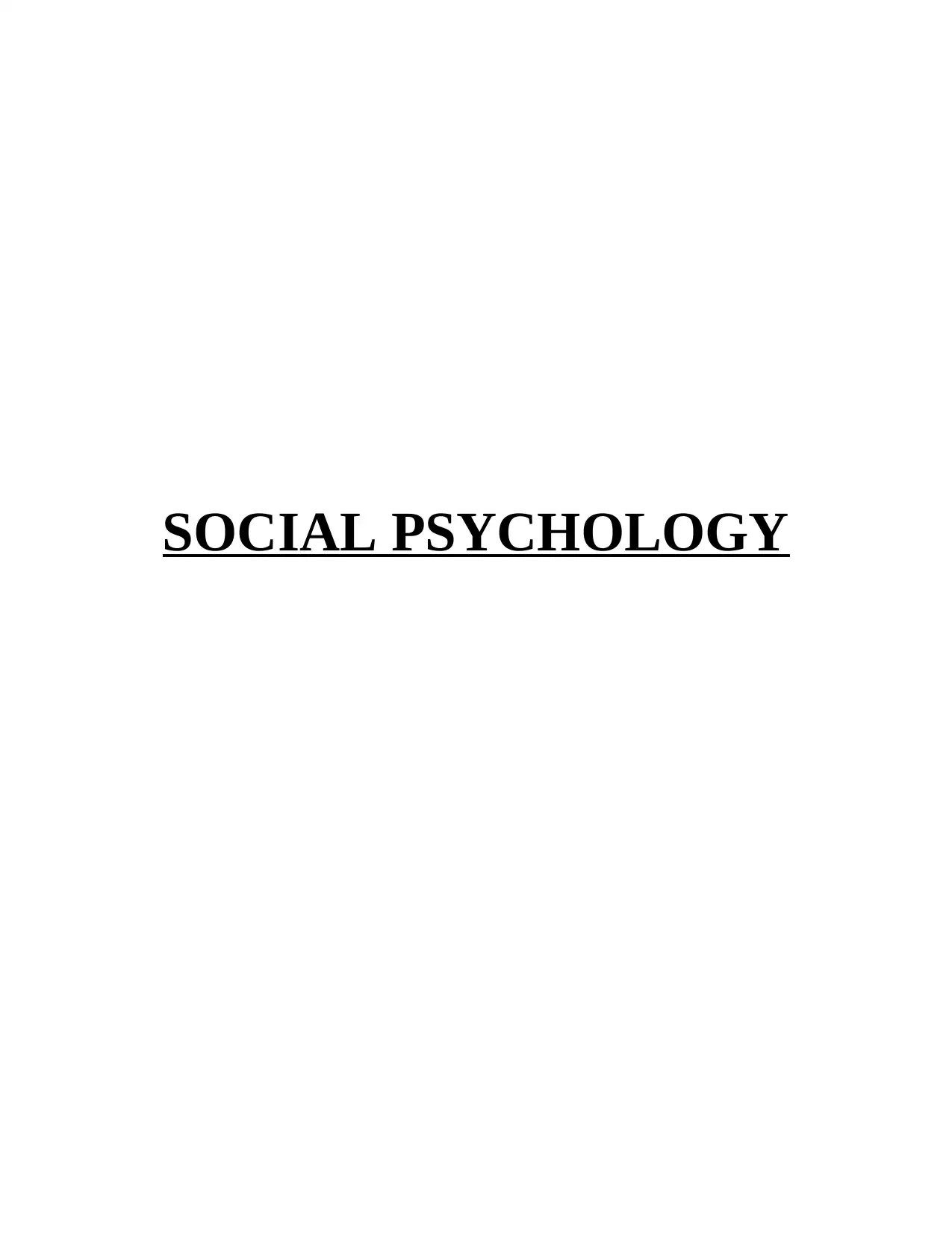
SOCIAL PSYCHOLOGY
Paraphrase This Document
Need a fresh take? Get an instant paraphrase of this document with our AI Paraphraser
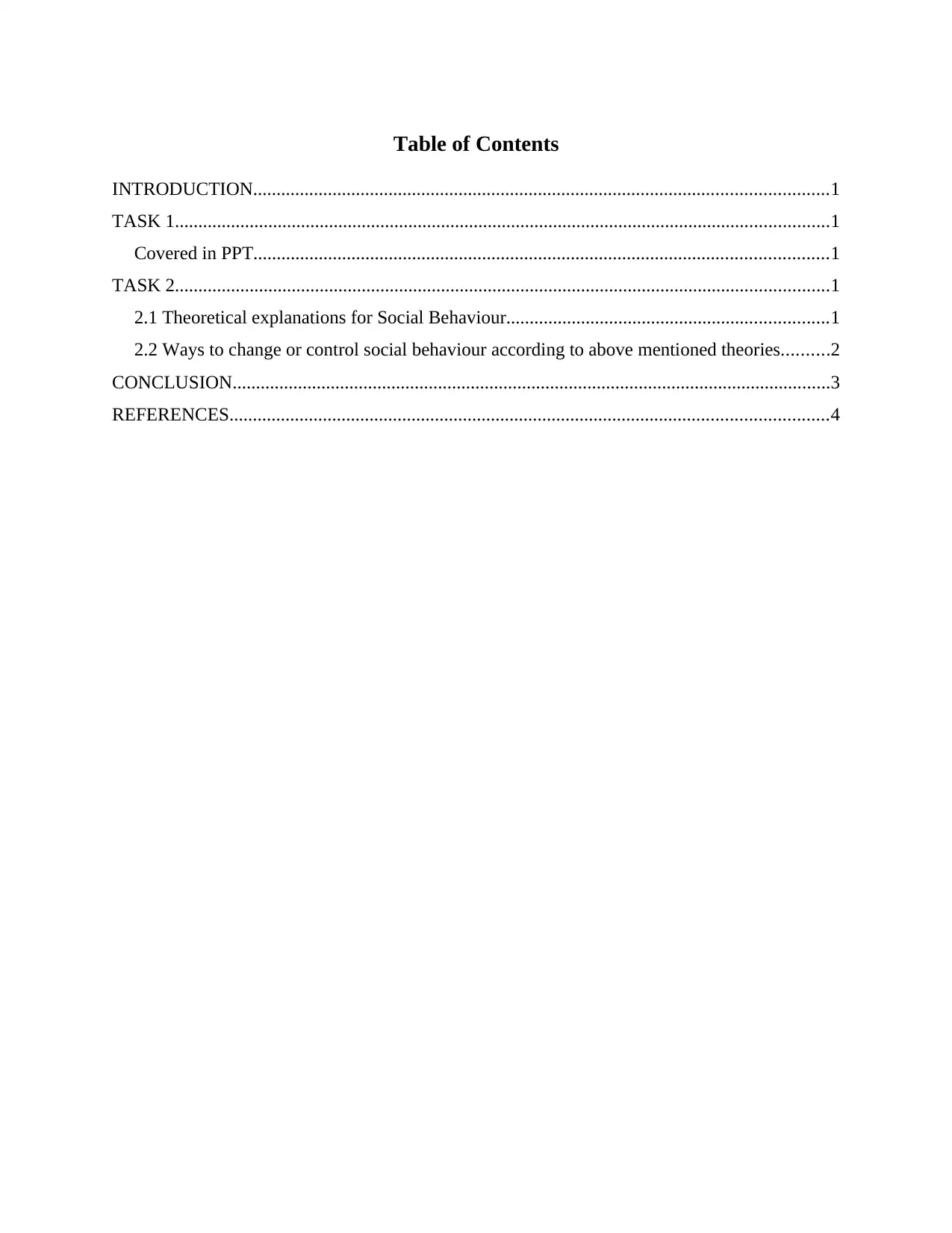
Table of Contents
INTRODUCTION...........................................................................................................................1
TASK 1............................................................................................................................................1
Covered in PPT...........................................................................................................................1
TASK 2............................................................................................................................................1
2.1 Theoretical explanations for Social Behaviour.....................................................................1
2.2 Ways to change or control social behaviour according to above mentioned theories..........2
CONCLUSION................................................................................................................................3
REFERENCES................................................................................................................................4
INTRODUCTION...........................................................................................................................1
TASK 1............................................................................................................................................1
Covered in PPT...........................................................................................................................1
TASK 2............................................................................................................................................1
2.1 Theoretical explanations for Social Behaviour.....................................................................1
2.2 Ways to change or control social behaviour according to above mentioned theories..........2
CONCLUSION................................................................................................................................3
REFERENCES................................................................................................................................4
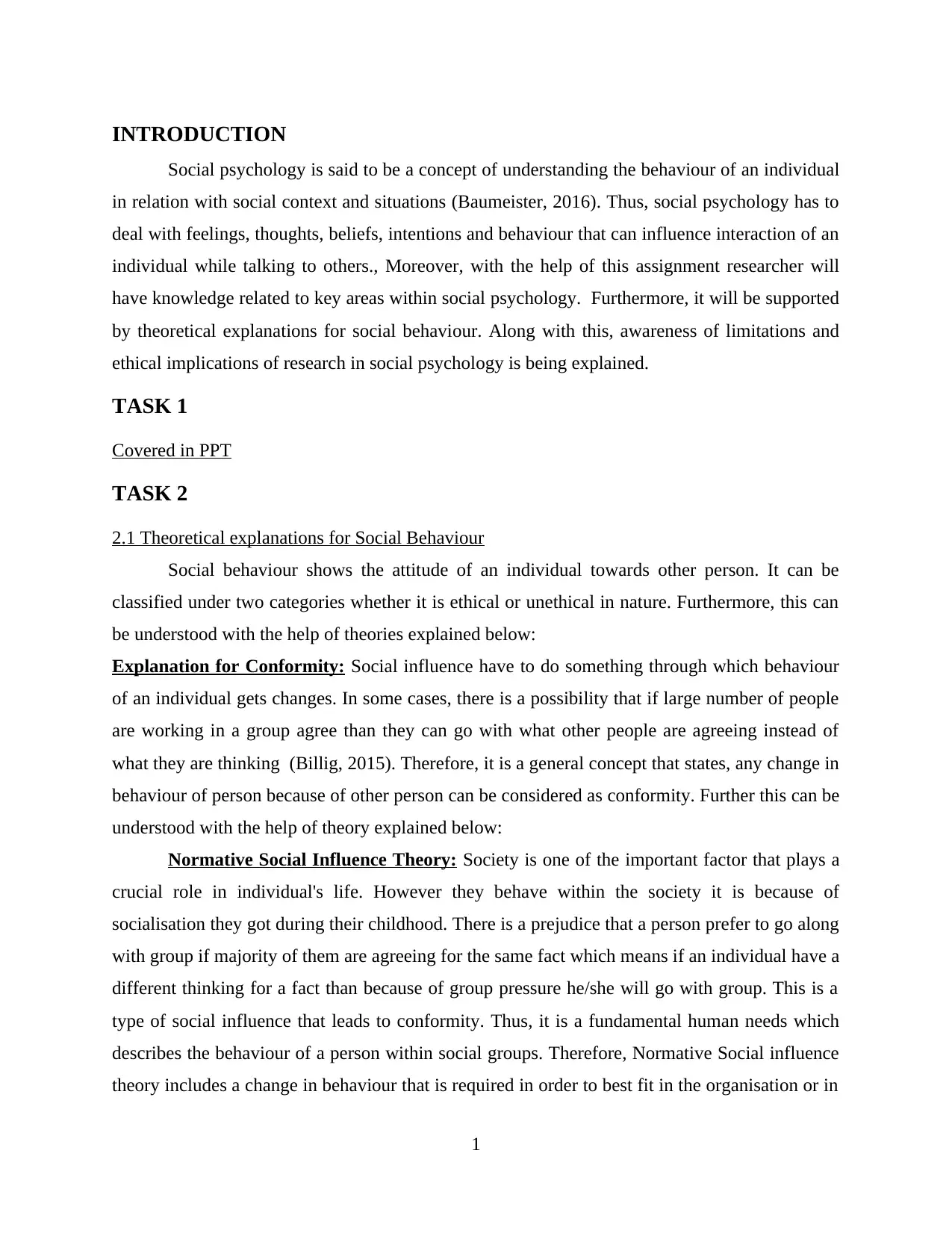
INTRODUCTION
Social psychology is said to be a concept of understanding the behaviour of an individual
in relation with social context and situations (Baumeister, 2016). Thus, social psychology has to
deal with feelings, thoughts, beliefs, intentions and behaviour that can influence interaction of an
individual while talking to others., Moreover, with the help of this assignment researcher will
have knowledge related to key areas within social psychology. Furthermore, it will be supported
by theoretical explanations for social behaviour. Along with this, awareness of limitations and
ethical implications of research in social psychology is being explained.
TASK 1
Covered in PPT
TASK 2
2.1 Theoretical explanations for Social Behaviour
Social behaviour shows the attitude of an individual towards other person. It can be
classified under two categories whether it is ethical or unethical in nature. Furthermore, this can
be understood with the help of theories explained below:
Explanation for Conformity: Social influence have to do something through which behaviour
of an individual gets changes. In some cases, there is a possibility that if large number of people
are working in a group agree than they can go with what other people are agreeing instead of
what they are thinking (Billig, 2015). Therefore, it is a general concept that states, any change in
behaviour of person because of other person can be considered as conformity. Further this can be
understood with the help of theory explained below:
Normative Social Influence Theory: Society is one of the important factor that plays a
crucial role in individual's life. However they behave within the society it is because of
socialisation they got during their childhood. There is a prejudice that a person prefer to go along
with group if majority of them are agreeing for the same fact which means if an individual have a
different thinking for a fact than because of group pressure he/she will go with group. This is a
type of social influence that leads to conformity. Thus, it is a fundamental human needs which
describes the behaviour of a person within social groups. Therefore, Normative Social influence
theory includes a change in behaviour that is required in order to best fit in the organisation or in
1
Social psychology is said to be a concept of understanding the behaviour of an individual
in relation with social context and situations (Baumeister, 2016). Thus, social psychology has to
deal with feelings, thoughts, beliefs, intentions and behaviour that can influence interaction of an
individual while talking to others., Moreover, with the help of this assignment researcher will
have knowledge related to key areas within social psychology. Furthermore, it will be supported
by theoretical explanations for social behaviour. Along with this, awareness of limitations and
ethical implications of research in social psychology is being explained.
TASK 1
Covered in PPT
TASK 2
2.1 Theoretical explanations for Social Behaviour
Social behaviour shows the attitude of an individual towards other person. It can be
classified under two categories whether it is ethical or unethical in nature. Furthermore, this can
be understood with the help of theories explained below:
Explanation for Conformity: Social influence have to do something through which behaviour
of an individual gets changes. In some cases, there is a possibility that if large number of people
are working in a group agree than they can go with what other people are agreeing instead of
what they are thinking (Billig, 2015). Therefore, it is a general concept that states, any change in
behaviour of person because of other person can be considered as conformity. Further this can be
understood with the help of theory explained below:
Normative Social Influence Theory: Society is one of the important factor that plays a
crucial role in individual's life. However they behave within the society it is because of
socialisation they got during their childhood. There is a prejudice that a person prefer to go along
with group if majority of them are agreeing for the same fact which means if an individual have a
different thinking for a fact than because of group pressure he/she will go with group. This is a
type of social influence that leads to conformity. Thus, it is a fundamental human needs which
describes the behaviour of a person within social groups. Therefore, Normative Social influence
theory includes a change in behaviour that is required in order to best fit in the organisation or in
1
⊘ This is a preview!⊘
Do you want full access?
Subscribe today to unlock all pages.

Trusted by 1+ million students worldwide
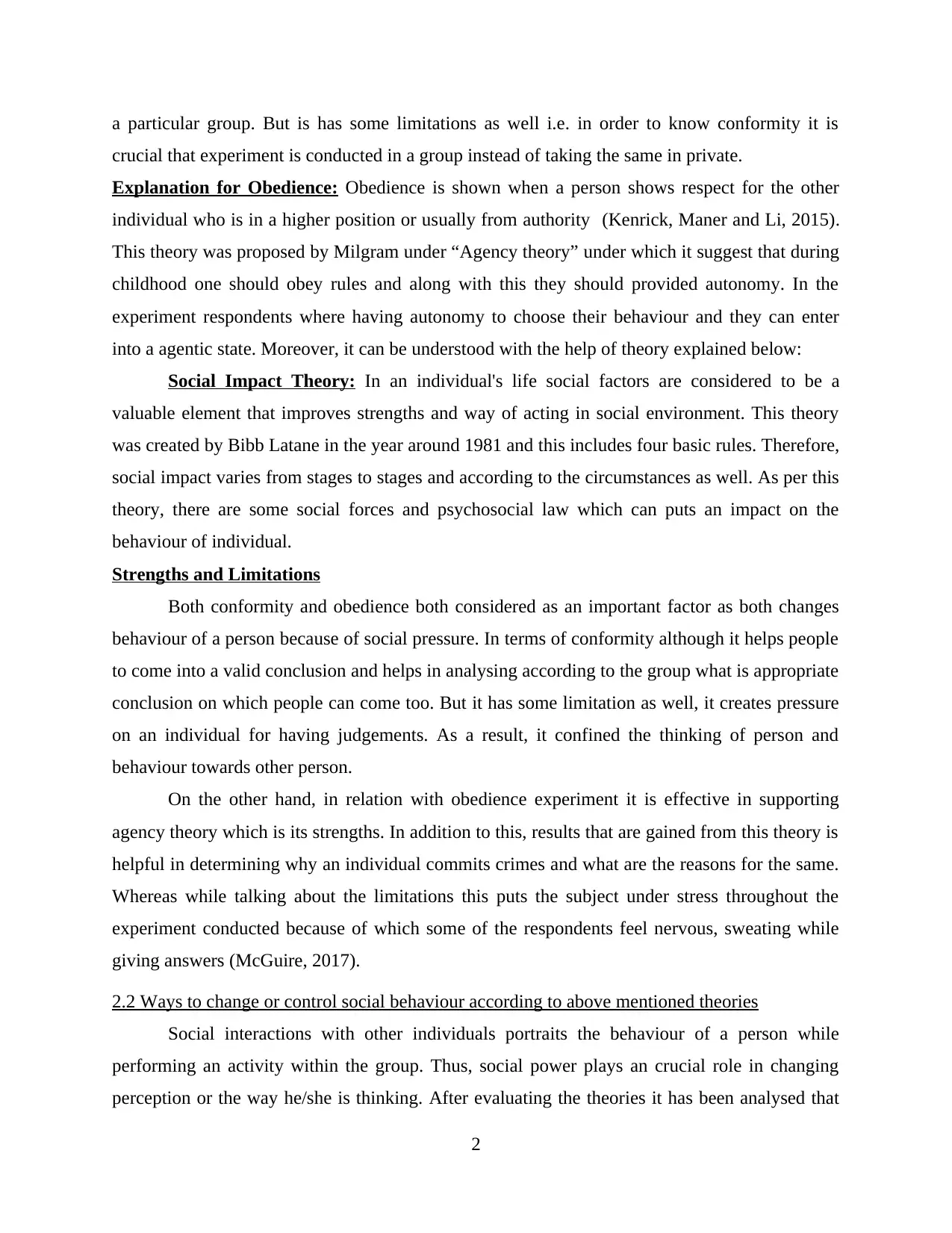
a particular group. But is has some limitations as well i.e. in order to know conformity it is
crucial that experiment is conducted in a group instead of taking the same in private.
Explanation for Obedience: Obedience is shown when a person shows respect for the other
individual who is in a higher position or usually from authority (Kenrick, Maner and Li, 2015).
This theory was proposed by Milgram under “Agency theory” under which it suggest that during
childhood one should obey rules and along with this they should provided autonomy. In the
experiment respondents where having autonomy to choose their behaviour and they can enter
into a agentic state. Moreover, it can be understood with the help of theory explained below:
Social Impact Theory: In an individual's life social factors are considered to be a
valuable element that improves strengths and way of acting in social environment. This theory
was created by Bibb Latane in the year around 1981 and this includes four basic rules. Therefore,
social impact varies from stages to stages and according to the circumstances as well. As per this
theory, there are some social forces and psychosocial law which can puts an impact on the
behaviour of individual.
Strengths and Limitations
Both conformity and obedience both considered as an important factor as both changes
behaviour of a person because of social pressure. In terms of conformity although it helps people
to come into a valid conclusion and helps in analysing according to the group what is appropriate
conclusion on which people can come too. But it has some limitation as well, it creates pressure
on an individual for having judgements. As a result, it confined the thinking of person and
behaviour towards other person.
On the other hand, in relation with obedience experiment it is effective in supporting
agency theory which is its strengths. In addition to this, results that are gained from this theory is
helpful in determining why an individual commits crimes and what are the reasons for the same.
Whereas while talking about the limitations this puts the subject under stress throughout the
experiment conducted because of which some of the respondents feel nervous, sweating while
giving answers (McGuire, 2017).
2.2 Ways to change or control social behaviour according to above mentioned theories
Social interactions with other individuals portraits the behaviour of a person while
performing an activity within the group. Thus, social power plays an crucial role in changing
perception or the way he/she is thinking. After evaluating the theories it has been analysed that
2
crucial that experiment is conducted in a group instead of taking the same in private.
Explanation for Obedience: Obedience is shown when a person shows respect for the other
individual who is in a higher position or usually from authority (Kenrick, Maner and Li, 2015).
This theory was proposed by Milgram under “Agency theory” under which it suggest that during
childhood one should obey rules and along with this they should provided autonomy. In the
experiment respondents where having autonomy to choose their behaviour and they can enter
into a agentic state. Moreover, it can be understood with the help of theory explained below:
Social Impact Theory: In an individual's life social factors are considered to be a
valuable element that improves strengths and way of acting in social environment. This theory
was created by Bibb Latane in the year around 1981 and this includes four basic rules. Therefore,
social impact varies from stages to stages and according to the circumstances as well. As per this
theory, there are some social forces and psychosocial law which can puts an impact on the
behaviour of individual.
Strengths and Limitations
Both conformity and obedience both considered as an important factor as both changes
behaviour of a person because of social pressure. In terms of conformity although it helps people
to come into a valid conclusion and helps in analysing according to the group what is appropriate
conclusion on which people can come too. But it has some limitation as well, it creates pressure
on an individual for having judgements. As a result, it confined the thinking of person and
behaviour towards other person.
On the other hand, in relation with obedience experiment it is effective in supporting
agency theory which is its strengths. In addition to this, results that are gained from this theory is
helpful in determining why an individual commits crimes and what are the reasons for the same.
Whereas while talking about the limitations this puts the subject under stress throughout the
experiment conducted because of which some of the respondents feel nervous, sweating while
giving answers (McGuire, 2017).
2.2 Ways to change or control social behaviour according to above mentioned theories
Social interactions with other individuals portraits the behaviour of a person while
performing an activity within the group. Thus, social power plays an crucial role in changing
perception or the way he/she is thinking. After evaluating the theories it has been analysed that
2
Paraphrase This Document
Need a fresh take? Get an instant paraphrase of this document with our AI Paraphraser
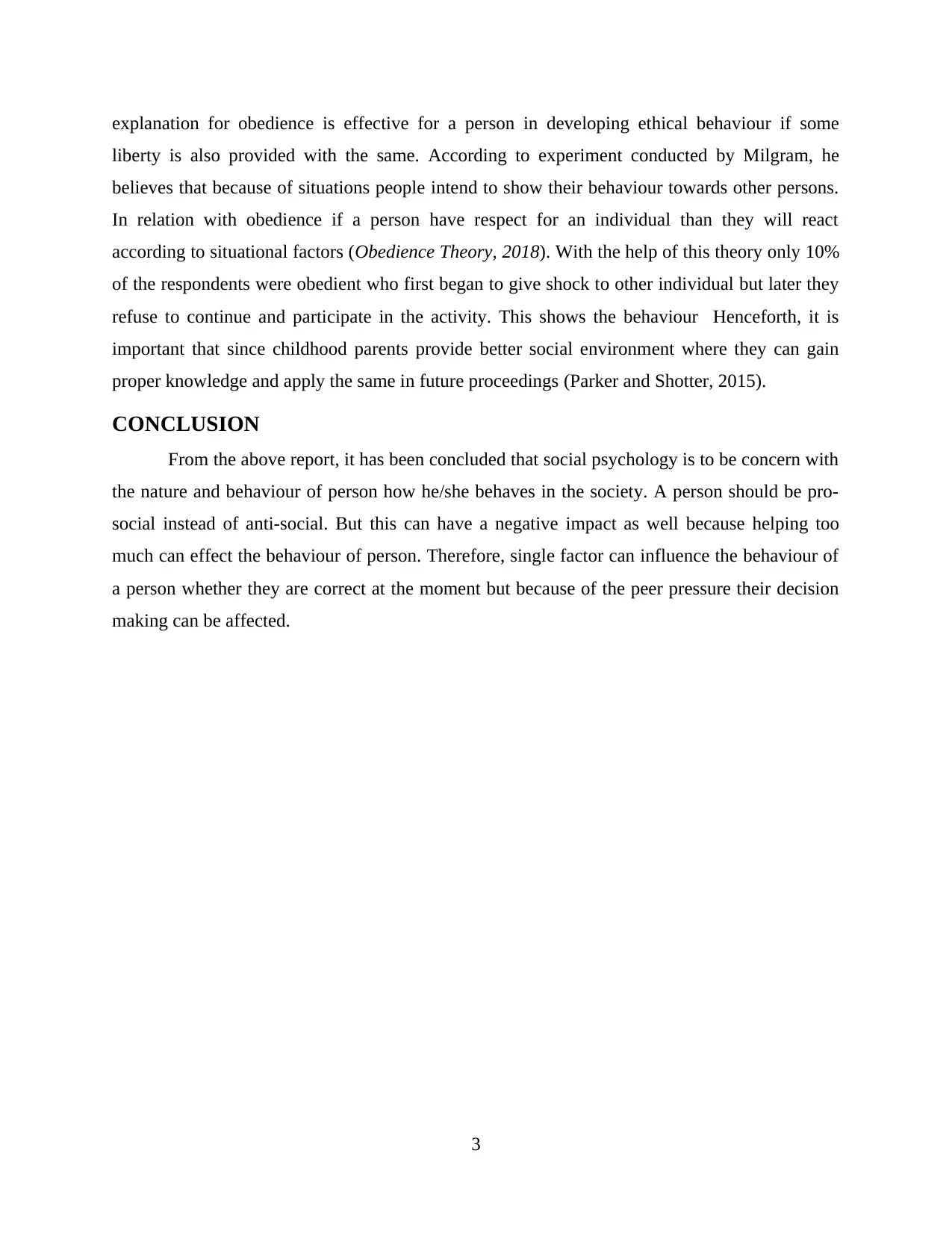
explanation for obedience is effective for a person in developing ethical behaviour if some
liberty is also provided with the same. According to experiment conducted by Milgram, he
believes that because of situations people intend to show their behaviour towards other persons.
In relation with obedience if a person have respect for an individual than they will react
according to situational factors (Obedience Theory, 2018). With the help of this theory only 10%
of the respondents were obedient who first began to give shock to other individual but later they
refuse to continue and participate in the activity. This shows the behaviour Henceforth, it is
important that since childhood parents provide better social environment where they can gain
proper knowledge and apply the same in future proceedings (Parker and Shotter, 2015).
CONCLUSION
From the above report, it has been concluded that social psychology is to be concern with
the nature and behaviour of person how he/she behaves in the society. A person should be pro-
social instead of anti-social. But this can have a negative impact as well because helping too
much can effect the behaviour of person. Therefore, single factor can influence the behaviour of
a person whether they are correct at the moment but because of the peer pressure their decision
making can be affected.
3
liberty is also provided with the same. According to experiment conducted by Milgram, he
believes that because of situations people intend to show their behaviour towards other persons.
In relation with obedience if a person have respect for an individual than they will react
according to situational factors (Obedience Theory, 2018). With the help of this theory only 10%
of the respondents were obedient who first began to give shock to other individual but later they
refuse to continue and participate in the activity. This shows the behaviour Henceforth, it is
important that since childhood parents provide better social environment where they can gain
proper knowledge and apply the same in future proceedings (Parker and Shotter, 2015).
CONCLUSION
From the above report, it has been concluded that social psychology is to be concern with
the nature and behaviour of person how he/she behaves in the society. A person should be pro-
social instead of anti-social. But this can have a negative impact as well because helping too
much can effect the behaviour of person. Therefore, single factor can influence the behaviour of
a person whether they are correct at the moment but because of the peer pressure their decision
making can be affected.
3
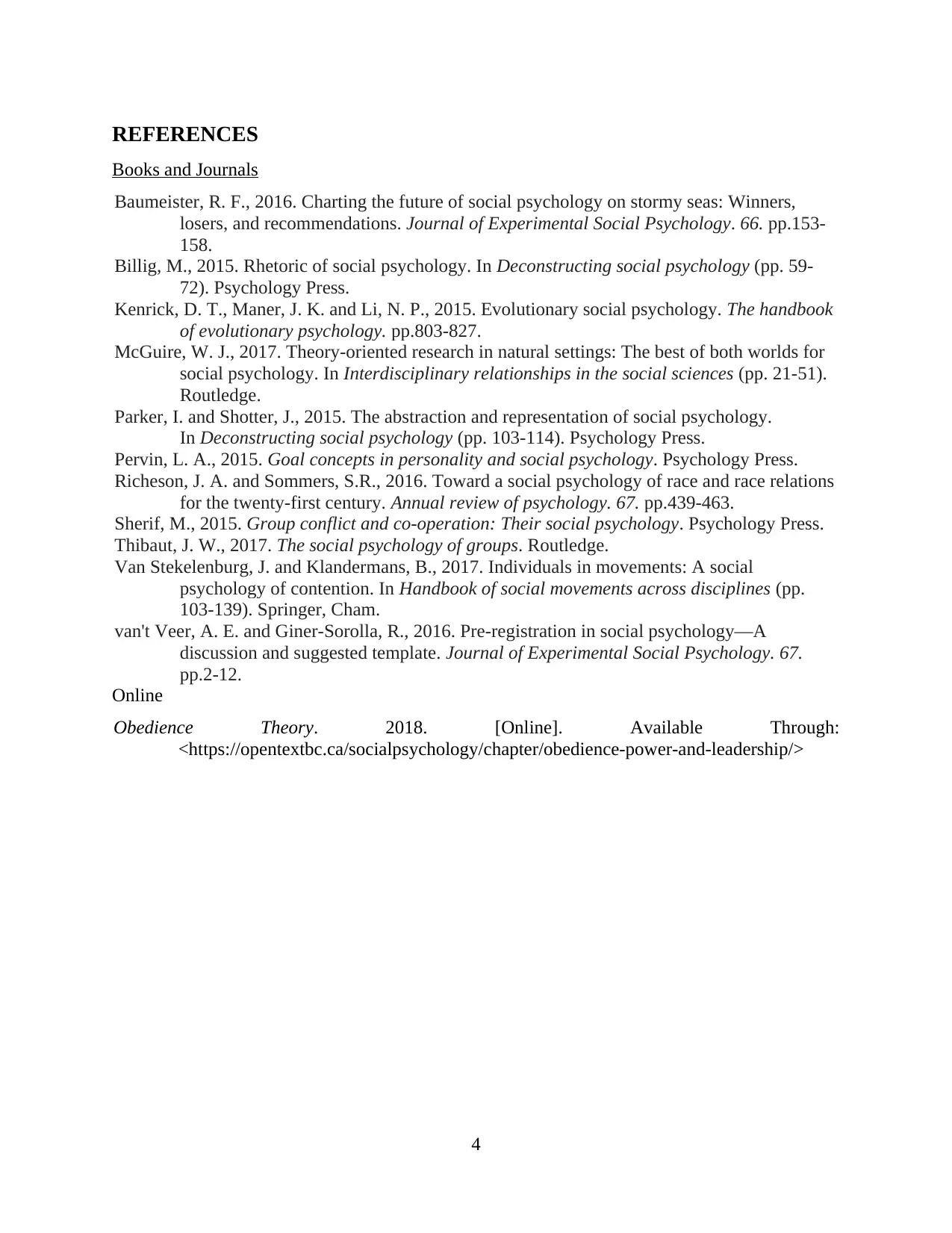
REFERENCES
Books and Journals
Baumeister, R. F., 2016. Charting the future of social psychology on stormy seas: Winners,
losers, and recommendations. Journal of Experimental Social Psychology. 66. pp.153-
158.
Billig, M., 2015. Rhetoric of social psychology. In Deconstructing social psychology (pp. 59-
72). Psychology Press.
Kenrick, D. T., Maner, J. K. and Li, N. P., 2015. Evolutionary social psychology. The handbook
of evolutionary psychology. pp.803-827.
McGuire, W. J., 2017. Theory-oriented research in natural settings: The best of both worlds for
social psychology. In Interdisciplinary relationships in the social sciences (pp. 21-51).
Routledge.
Parker, I. and Shotter, J., 2015. The abstraction and representation of social psychology.
In Deconstructing social psychology (pp. 103-114). Psychology Press.
Pervin, L. A., 2015. Goal concepts in personality and social psychology. Psychology Press.
Richeson, J. A. and Sommers, S.R., 2016. Toward a social psychology of race and race relations
for the twenty-first century. Annual review of psychology. 67. pp.439-463.
Sherif, M., 2015. Group conflict and co-operation: Their social psychology. Psychology Press.
Thibaut, J. W., 2017. The social psychology of groups. Routledge.
Van Stekelenburg, J. and Klandermans, B., 2017. Individuals in movements: A social
psychology of contention. In Handbook of social movements across disciplines (pp.
103-139). Springer, Cham.
van't Veer, A. E. and Giner-Sorolla, R., 2016. Pre-registration in social psychology—A
discussion and suggested template. Journal of Experimental Social Psychology. 67.
pp.2-12.
Online
Obedience Theory. 2018. [Online]. Available Through:
<https://opentextbc.ca/socialpsychology/chapter/obedience-power-and-leadership/>
4
Books and Journals
Baumeister, R. F., 2016. Charting the future of social psychology on stormy seas: Winners,
losers, and recommendations. Journal of Experimental Social Psychology. 66. pp.153-
158.
Billig, M., 2015. Rhetoric of social psychology. In Deconstructing social psychology (pp. 59-
72). Psychology Press.
Kenrick, D. T., Maner, J. K. and Li, N. P., 2015. Evolutionary social psychology. The handbook
of evolutionary psychology. pp.803-827.
McGuire, W. J., 2017. Theory-oriented research in natural settings: The best of both worlds for
social psychology. In Interdisciplinary relationships in the social sciences (pp. 21-51).
Routledge.
Parker, I. and Shotter, J., 2015. The abstraction and representation of social psychology.
In Deconstructing social psychology (pp. 103-114). Psychology Press.
Pervin, L. A., 2015. Goal concepts in personality and social psychology. Psychology Press.
Richeson, J. A. and Sommers, S.R., 2016. Toward a social psychology of race and race relations
for the twenty-first century. Annual review of psychology. 67. pp.439-463.
Sherif, M., 2015. Group conflict and co-operation: Their social psychology. Psychology Press.
Thibaut, J. W., 2017. The social psychology of groups. Routledge.
Van Stekelenburg, J. and Klandermans, B., 2017. Individuals in movements: A social
psychology of contention. In Handbook of social movements across disciplines (pp.
103-139). Springer, Cham.
van't Veer, A. E. and Giner-Sorolla, R., 2016. Pre-registration in social psychology—A
discussion and suggested template. Journal of Experimental Social Psychology. 67.
pp.2-12.
Online
Obedience Theory. 2018. [Online]. Available Through:
<https://opentextbc.ca/socialpsychology/chapter/obedience-power-and-leadership/>
4
⊘ This is a preview!⊘
Do you want full access?
Subscribe today to unlock all pages.

Trusted by 1+ million students worldwide
1 out of 6
Related Documents
Your All-in-One AI-Powered Toolkit for Academic Success.
+13062052269
info@desklib.com
Available 24*7 on WhatsApp / Email
![[object Object]](/_next/static/media/star-bottom.7253800d.svg)
Unlock your academic potential
Copyright © 2020–2026 A2Z Services. All Rights Reserved. Developed and managed by ZUCOL.





